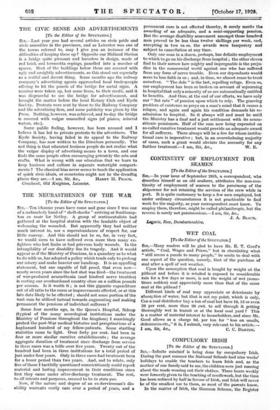THE CIVIC SENSE AND ADVERTISEMENTS
[To the Editor of the SrEcre.ron.]
Sts,—Last year you had several articles on civic pride and civic amenities in the provinces, and as Leicester was one of the towns referred to, may I give you an instance of the difficulties of keeping these up ? Opposite our Midland Station is a bridge quite pleasant and harmless in design, made of red brick and terracotta copings, panelled into a number of spaces. Most of the buildings below these are covered with ugly and unsightly advertisements, so this stood out especially as a restful and decent thing. Some months ago the railway company's advertising agents approached local tradespeople offering to let the panels of the bridge for metal signs. A number were taken up, but some firms, to their credit, said it was disgraceful to use the bridge for advertisement, and brought the matter before the local Rotary Club and Kyrie Society. Protests were sent by these to the Railway Company and the advertising firm, and some publicity was given by the Press. Nothing, however, was achieved, and to-day the bridge is covered with vulgar enamelled signs (of pianos, mineral waters, etc.).
Some public feeling, however, has been aroused and I believe it has led to private protests to the advertisers. The Kyrie Society, having failed in its appeal to the Railway Company, has now written to the Directors personally. The sad thing is that educated business people do not realize what the vulgar display of advertising means to a town, and one finds the same people often encouraging privately the arts and crafts. What is wrong with our education that we learn to keep business and culture in separate watertight compart- ments ? The classical bias never seems to teach the application of quick civic ideals, or cemeteries might not be the dreadful places they are.—I am, Sir, &c., HARRY IL PEACH. Crowbank, Old Knighton, Leicester.


















































 Previous page
Previous page